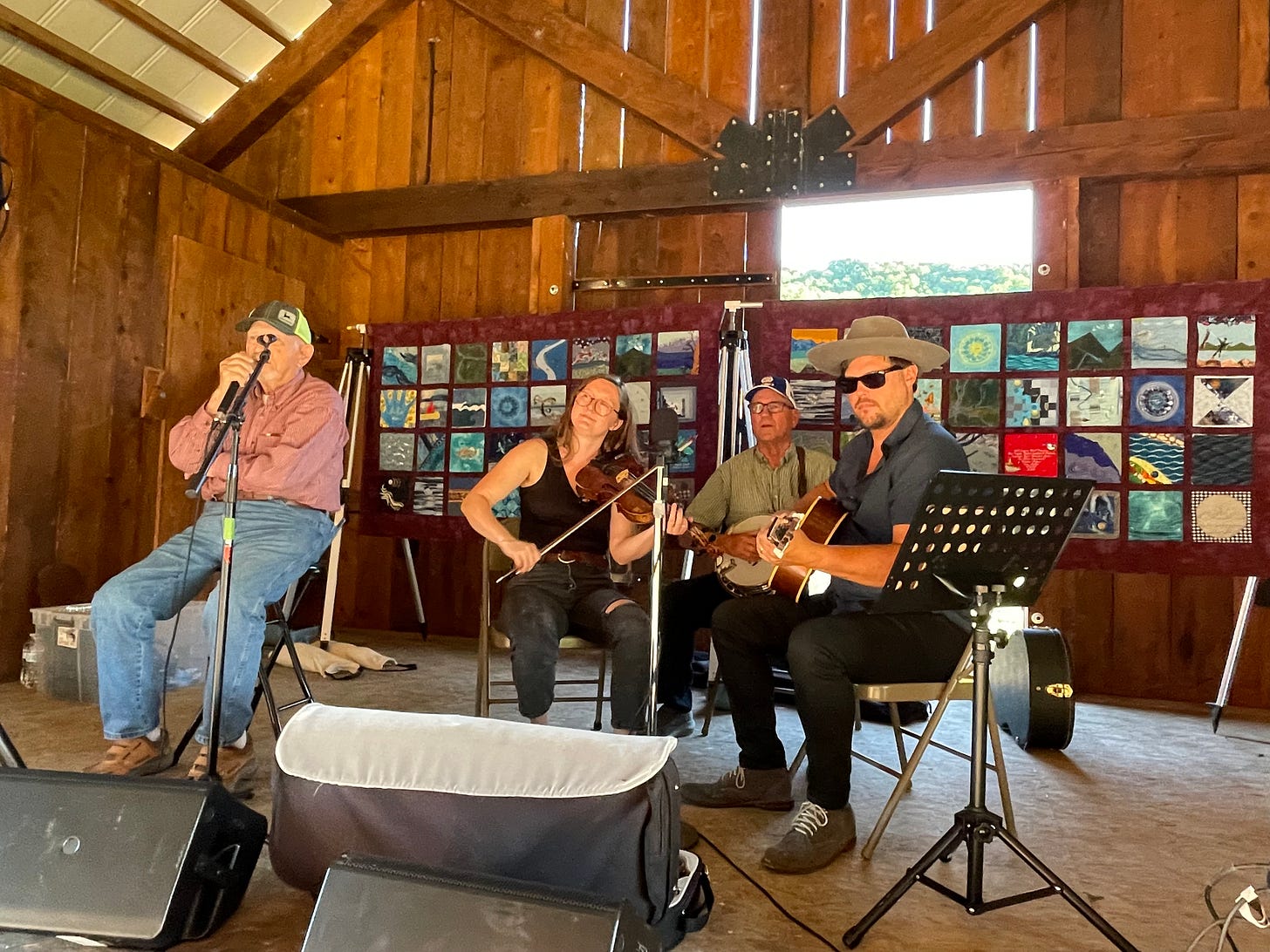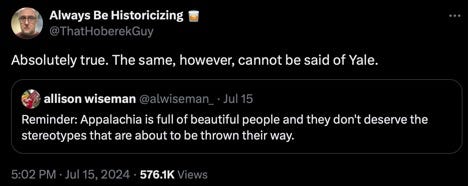The following are a couple of lines from Sarah Ogan Gunning’s 1937 folk song “Come All You Coal Miners:”
Coal mining is the most dangerous work in our land today / With plenty of dirty slaving work, and very little pay / Coal miner, won't you wake up, and open your eyes and see / What the dirty capitalist system is doing to you and me
You might be surprised that Gunning—a union supporter, folk singer, and coal miner’s wife from Bell County, Kentucky—would be referring to the “dirty capitalist system” in 1937 (a later line from the song suggests we “sink this capitalist system in the darkest pits of hell.” Go off, queen). I think if you asked the average American what was going on in rural Kentucky in 1937, their first answer probably wouldn’t be “a mass movement against industrial capitalism.” But then again, the average American doesn’t know a lot about rural labor history. During the 1930s, the United Mine Workers of America boasted a membership of roughly 500,000 (today their t-shirts still bear the slogan “we are everywhere”). I’m not implying that all 500,000 UMWA members were marching around signing about the “dirty capitalist system,” but folk musicians like Gunning, Jean Ritchie, and Hazel Dickens wrote the music that fueled and reflected common sentiments of the labor movement in places like eastern Kentucky. Gunning was obviously not preaching to the converted (she says “won’t you wake up,” implying that not everyone sees things as she does), but in the coalfields she came to represent a generation of activist women who were brutally aware that their male relatives were worth little more than a bag of bones to the mine bosses. Her songs resonated in 1937, and they’re still resonating—a friend here in Huntington recently responded to an informal Instagram poll I made and said that “Come All You Coal Miners” was a major part of her political education growing up in Appalachia.
Folk music (literally “the peoples’ music”) is good because it’s true. There’s an undeniable musical and emotional intensity present in any group of old timers playing laborers’ songs—in any culture and in any language. Or in Tracy Chapman’s live rendition of “Fast Car” (which is folk! Fight me!).

As squirmy as it is to acknowledge, this music is true because it’s full of suffering. Folk, bluegrass, and strains of country (notice that I’m not talking about Dirks Bentley’s “I’m Getting Drunk on a Plane” here), like their musical sibling, the blues, were written in blood. Anyone from a working-class background knows that you can’t have a twenty-minute conversation with someone over sixty without a casual mention of Great Uncle So-and-So’s death at the hands of some piece of industrial equipment. Many people aren’t close to that experience anymore. Though Grandaddy’s hearing loss from farm equipment was a rote family story when I was growing up, the first time I met someone who could describe how their grandfather was crushed between two colliding mine carts, I genuinely pictured a scene from Looney Tunes because that kind of workplace accident was literally out of my frame of reference—a fact of privilege and something that would be funny if it wasn’t kind of embarrassing.
To quote James Baldwin, who would have been 100 this past week, “I do not mean to be sentimental about suffering.” It’s not that happy folk music isn’t good, it’s that folk music at its best is true, and the truth of being a working person in a low-paying job or a manual labor field—especially in so-called “right-to-work” states in the South—is pretty damn bloody. In Solidarity Forever, Pete Seeger sings
It is we who plowed the prairies / Built the cities where they trade / Dug the mines and built the workshops, endless miles of railroad laid / Now we stand outcast and starving midst the wonders we have made / But the union makes us strong
It’s worth acknowledging, while I’m at it, that Native unionists would probably have some words for Pete Seeger over this rather glorious white-working-man’s picture of Manifest Destiny (whose prairies did we plow, Peter?). There’s a reason why this verse was skipped at an environmentalist conference I was at a few months ago. But that’s another essay and I’m running out of room here.
In any case, “we” is the operative word in Seeger’s verses above. The reason Tracy Chapman knows that, in America, you have to drop out of school to take care of a sick parent with no employer health insurance (see “Fast Car”) is because she lived that. Seeger is referencing a common experience with his “we” in “Solidarity Forever.” Gunning sings about what “the system” is doing to “you and me.” Her conclusions are really not terribly radical – she describes a common experience: While the rich & mighty capitalist / Goes to rest in jewels & silk / My darling blue-eyed baby / Has died for the want of milk. Her “economic analysis” — we are part of a collective economic underclass and someone is skimming off our wages unjustly — is not one you need an economics degree from the University of Chicago to understand (you might need such a degree, however, if you’re looking to absolutely obliterate the economy of a Global South country you consider your theoretical playground—see Chile, Chicago Boys etc.).
Though the term “lived experience” is thrown around a little carelessly in liberal discourse, I think it’s been tremendously useful in checking a very particular kind of holier-than-thou intellectualist sentiment. More and more I think progressives are reckoning with the fact that working-class people have an automatic education in economic systems (see below memes). I genuinely think you could learn just about everything you need to know about basic macro-economics if you listened to enough Woody Guthrie.
Folks from mining communities sometimes remark that they used to be able to tell how the U.S. economy was doing based on how many times a day the coal train came through town. Being on the supply/production side of the economy can be, for some people, a radicalizing experience. I think there is a kind of leftist wet dream that after two days on the Purdue chicken factory conveyor line everyone would become a socialist, or something to that effect, and its obviously more complicated than that. I could write a book (and many people have – see Hamilton Nolan’s The Hammer for instance) addressing why the working class is thought of as, and to a significant extent is, politically conservative (a couple reasons include: relentless “we’re a family” campaigns creating loyalty to employers; post-Reagan decline of union strength; the Democrats’ refusal to send long-term organizers to states they deem a lost cause, etc.).
But for a very interesting moment in the era of Sarah Ogan Gunning and Mother Jones, there was serious momentum behind an anti-big-capitalism movement among rural working-class people. The music of the this time and place reflects that, and the fact that so many people don’t know about said music is also telling. I just ran across this great quote from the historian Archie Green about Gunning: “In a society that can honor Loretta Lynn or Emmylou Harris, but not Sarah Ogan Gunning, clearly something is wrong. We haven’t been able to deal with our roots [or] our giants.”
This is all to say that I really like political music, and political art. I think we need it, and I think it’s work that should be well-compensated and appreciated. I have actually considered putting up a paywall for this Substack before, but this is my ground for experimentation—and I’m not necessarily splendid at meeting the kind of regular deadlines that I would feel obligated to meet with my posts if people were paying for this. I do actually make some money off of writing, though – I’ll link my latest articles below. Thanks as always for reading Hannah’s Field Notes and letting me attack econ majors at will until the day arrives when someone will pay me to do it forever.
My latest article: https://www.100daysinappalachia.com/2024/07/young-appalachians-want-better-intergenerational-political-conversations/
Click here for a video of Sarah Ogan Gunning talking about her music and singing “Come All You Coal Miners” from the wonderful Appalshop archives






nuanced, funny, direct, and full of music, as all the best hwb pieces are. i loved this (and learned a lot) and am so glad that baldwin found his way in. also, currently reading Lee Martin’s “From Our House” which might be of interest as a chronicle of the fallout from one of the farm accidents you describe